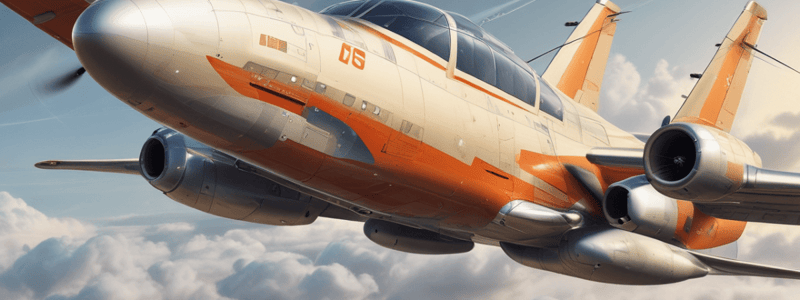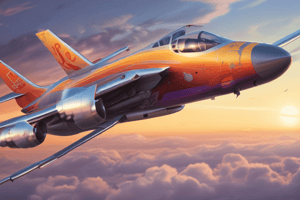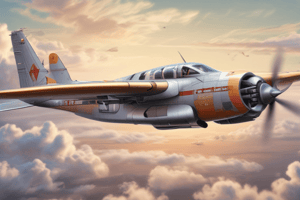Podcast
Questions and Answers
What is the primary consequence of a rearward CG in an aircraft?
What is the primary consequence of a rearward CG in an aircraft?
- Improved stability and reduced risk of stall
- No significant effect on aircraft performance
- Reduced efficiency and increased risk of stall (correct)
- Increased weight and drag
What is the critical factor that pilots must manage during flight to ensure optimal aircraft performance and safety?
What is the critical factor that pilots must manage during flight to ensure optimal aircraft performance and safety?
- Center of gravity shift (correct)
- Drag reduction
- Fuel consumption rate
- Weight distribution
What is the primary objective of aircraft designers when it comes to weight, drag, and CG?
What is the primary objective of aircraft designers when it comes to weight, drag, and CG?
- To maximize CG
- To minimize weight and drag
- To create efficient, safe, and reliable machines (correct)
- To optimize fuel consumption
What happens to the weight of an aircraft during flight as fuel is consumed?
What happens to the weight of an aircraft during flight as fuel is consumed?
Why is it essential for pilots to be vigilant about the distribution and amount of cargo and fuel?
Why is it essential for pilots to be vigilant about the distribution and amount of cargo and fuel?
What is the relationship between weight, drag, and CG in an aircraft?
What is the relationship between weight, drag, and CG in an aircraft?
What is the primary concern for pilots when managing the CG during flight?
What is the primary concern for pilots when managing the CG during flight?
What happens to the CG of an aircraft as fuel is consumed during flight?
What happens to the CG of an aircraft as fuel is consumed during flight?
What is the primary goal of aircraft designers when it comes to CG?
What is the primary goal of aircraft designers when it comes to CG?
What is the consequence of an aircraft being designed with a CG outside the allowable limits?
What is the consequence of an aircraft being designed with a CG outside the allowable limits?
An aircraft with a forward CG will always experience reduced stability.
An aircraft with a forward CG will always experience reduced stability.
The weight of an aircraft remains constant during flight.
The weight of an aircraft remains constant during flight.
Pilots only need to consider the distribution of cargo when managing the CG.
Pilots only need to consider the distribution of cargo when managing the CG.
Aircraft designers prioritize creating efficient machines over safe and reliable ones.
Aircraft designers prioritize creating efficient machines over safe and reliable ones.
The CG of an aircraft only affects its performance during takeoff and landing.
The CG of an aircraft only affects its performance during takeoff and landing.
The CG of an aircraft is only affected by the weight of the cargo.
The CG of an aircraft is only affected by the weight of the cargo.
Pilots do not need to adjust the CG of an aircraft during flight.
Pilots do not need to adjust the CG of an aircraft during flight.
Aircraft designers can ignore the relationships between weight, drag, and CG when designing an aircraft.
Aircraft designers can ignore the relationships between weight, drag, and CG when designing an aircraft.
The CG of an aircraft is fixed and cannot be changed during flight.
The CG of an aircraft is fixed and cannot be changed during flight.
Aircraft performance is not affected by the CG of the aircraft.
Aircraft performance is not affected by the CG of the aircraft.
What are the implications of an aircraft being designed with a CG that is too close to the forward or rearward limits?
What are the implications of an aircraft being designed with a CG that is too close to the forward or rearward limits?
How do pilots maintain optimal aircraft performance and safety during flight, considering the changes in weight and CG?
How do pilots maintain optimal aircraft performance and safety during flight, considering the changes in weight and CG?
What is the significance of understanding the relationships between weight, drag, and CG in aircraft design and operation?
What is the significance of understanding the relationships between weight, drag, and CG in aircraft design and operation?
What are the consequences of failing to manage the CG during flight, considering the changing weight of the aircraft?
What are the consequences of failing to manage the CG during flight, considering the changing weight of the aircraft?
How do changes in fuel consumption during flight affect the aircraft's weight and CG?
How do changes in fuel consumption during flight affect the aircraft's weight and CG?
What is the primary challenge in managing the CG during flight, considering the interplay between weight, drag, and CG?
What is the primary challenge in managing the CG during flight, considering the interplay between weight, drag, and CG?
What is the critical consideration for aircraft designers when designing an aircraft to handle maximum weights?
What is the critical consideration for aircraft designers when designing an aircraft to handle maximum weights?
How do pilots ensure the aircraft operates within its performance envelope, considering the relationships between weight, drag, and CG?
How do pilots ensure the aircraft operates within its performance envelope, considering the relationships between weight, drag, and CG?
What is the significance of the CG in determining an aircraft's performance and safety, considering the interplay between weight, drag, and CG?
What is the significance of the CG in determining an aircraft's performance and safety, considering the interplay between weight, drag, and CG?
What are the implications of an aircraft's CG being outside the allowable limits, considering the relationships between weight, drag, and CG?
What are the implications of an aircraft's CG being outside the allowable limits, considering the relationships between weight, drag, and CG?
Flashcards are hidden until you start studying
Study Notes
Factors Influencing Aircraft Performance
- Weight and drag are two pivotal factors that directly influence an aircraft's performance.
- Weight is a crucial parameter that affects fuel economy, maneuverability, and required thrust to overcome gravity.
- A heavier aircraft needs more power, more fuel, and a longer runway to ascend.
Drag
- Drag is the resistant force that slows an aircraft down.
- Drag is composed of both parasite and induced drag.
- Parasite drag includes skin friction, form drag, and interference drag.
- Induced drag is a byproduct of generating lift and increases with the angle of attack until the aircraft reaches an aerodynamic stall.
Interplay Between Weight and Drag
- The interplay between weight and drag is crucial during takeoff, climb, cruise, and descent.
- During takeoff, a plane must combat its own mass and the drag pulling it earthward to rise into the sky.
- In cruising, the aircraft seeks a delicate balance, maintaining altitude and momentum with efficient fuel use.
Center of Gravity (CG)
- The center of gravity is the point where all of an aircraft's mass is considered to be concentrated.
- The CG must be within certain limits for an aircraft to fly safely.
- The CG affects an aircraft's stability, control, and performance.
- A correctly positioned CG makes the aircraft stable and easier to control.
Design and Performance Considerations
- Aircraft designers must balance weight reduction with durability and cost.
- Aerodynamic design choices minimize drag with sleek profiles and innovation.
- The calculated trade-offs between weight and durability or cost manifest in aircraft that are marvels of efficiency.
Importance of Understanding Weight, Drag, and CG
- Pilots and engineers must understand how weight and drag will influence every aspect of their command.
- Understanding weight, drag, and CG is essential for flight planning, fuel management, and safety.
- The interplay between weight, drag, and CG is a delicate balance that requires careful management to ensure optimal aircraft performance and safety.
Factors Influencing Aircraft Performance
- Weight and drag are two pivotal factors that directly influence an aircraft's performance.
- Weight is a crucial parameter that affects fuel economy, maneuverability, and required thrust to overcome gravity.
- A heavier aircraft needs more power, more fuel, and a longer runway to ascend.
Drag
- Drag is the resistant force that slows an aircraft down.
- Drag is composed of both parasite and induced drag.
- Parasite drag includes skin friction, form drag, and interference drag.
- Induced drag is a byproduct of generating lift and increases with the angle of attack until the aircraft reaches an aerodynamic stall.
Interplay Between Weight and Drag
- The interplay between weight and drag is crucial during takeoff, climb, cruise, and descent.
- During takeoff, a plane must combat its own mass and the drag pulling it earthward to rise into the sky.
- In cruising, the aircraft seeks a delicate balance, maintaining altitude and momentum with efficient fuel use.
Center of Gravity (CG)
- The center of gravity is the point where all of an aircraft's mass is considered to be concentrated.
- The CG must be within certain limits for an aircraft to fly safely.
- The CG affects an aircraft's stability, control, and performance.
- A correctly positioned CG makes the aircraft stable and easier to control.
Design and Performance Considerations
- Aircraft designers must balance weight reduction with durability and cost.
- Aerodynamic design choices minimize drag with sleek profiles and innovation.
- The calculated trade-offs between weight and durability or cost manifest in aircraft that are marvels of efficiency.
Importance of Understanding Weight, Drag, and CG
- Pilots and engineers must understand how weight and drag will influence every aspect of their command.
- Understanding weight, drag, and CG is essential for flight planning, fuel management, and safety.
- The interplay between weight, drag, and CG is a delicate balance that requires careful management to ensure optimal aircraft performance and safety.
Factors Influencing Aircraft Performance
- Weight and drag are two pivotal factors that directly influence an aircraft's performance.
- Weight is a crucial parameter that affects fuel economy, maneuverability, and required thrust to overcome gravity.
- A heavier aircraft needs more power, more fuel, and a longer runway to ascend.
Drag
- Drag is the resistant force that slows an aircraft down.
- Drag is composed of both parasite and induced drag.
- Parasite drag includes skin friction, form drag, and interference drag.
- Induced drag is a byproduct of generating lift and increases with the angle of attack until the aircraft reaches an aerodynamic stall.
Interplay Between Weight and Drag
- The interplay between weight and drag is crucial during takeoff, climb, cruise, and descent.
- During takeoff, a plane must combat its own mass and the drag pulling it earthward to rise into the sky.
- In cruising, the aircraft seeks a delicate balance, maintaining altitude and momentum with efficient fuel use.
Center of Gravity (CG)
- The center of gravity is the point where all of an aircraft's mass is considered to be concentrated.
- The CG must be within certain limits for an aircraft to fly safely.
- The CG affects an aircraft's stability, control, and performance.
- A correctly positioned CG makes the aircraft stable and easier to control.
Design and Performance Considerations
- Aircraft designers must balance weight reduction with durability and cost.
- Aerodynamic design choices minimize drag with sleek profiles and innovation.
- The calculated trade-offs between weight and durability or cost manifest in aircraft that are marvels of efficiency.
Importance of Understanding Weight, Drag, and CG
- Pilots and engineers must understand how weight and drag will influence every aspect of their command.
- Understanding weight, drag, and CG is essential for flight planning, fuel management, and safety.
- The interplay between weight, drag, and CG is a delicate balance that requires careful management to ensure optimal aircraft performance and safety.
Studying That Suits You
Use AI to generate personalized quizzes and flashcards to suit your learning preferences.




